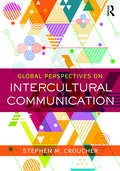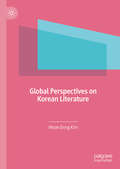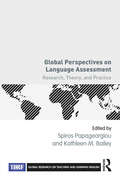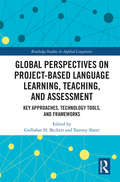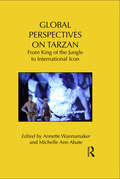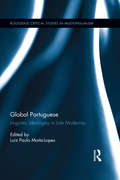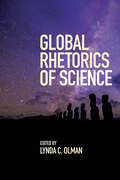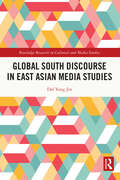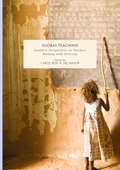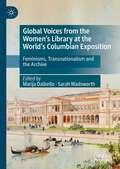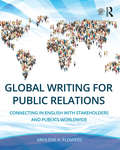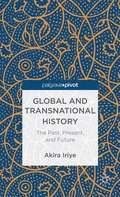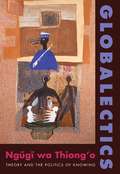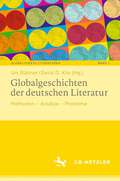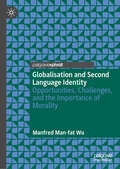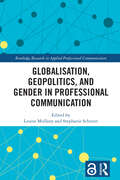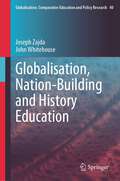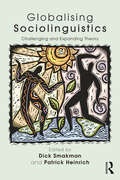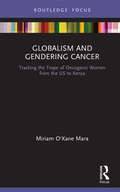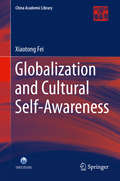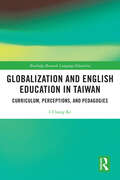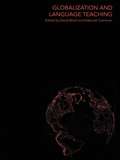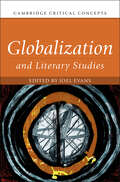- Table View
- List View
Global Perspectives on Intercultural Communication
by Stephen M. CroucherWhat is intercultural communication? How does perspective shape a person’s definition of the key tenets of the term and the field? These are the core questions explored by this accessible global introduction to intercultural communication. Each chapter explores the topic from a different geographic, religious, theoretical, and/or methodological perspective, with an emphasis on non-Western approaches, including Buddhist, South American, Muslim, and Chinese perspectives. Featuring the voices of a range of international contributors, this new textbook presents the full breadth of diverse approaches to intercultural communication and showcases the economic, political, and cultural/societal needs for and benefits of communicative competence.
Global Perspectives on Korean Literature
by Wook-Dong KimThis book explores Korean literature from a broadly global perspective from the mid-9th century to the present, with special emphasis on how it has been influenced by, as well as it has influenced, literatures of other nations. Beginning with the Korean version of the King Midas and his ass’s ears tale in the Silla dynasty, it moves on to discuss Ewa, what might be called the first missionary novel about Korea written by a Western missionary W. Arthur Noble. The book also considers the extent to which in writing fiction and essays Jack London gained grist for his writing from his experience in Korea as a Russo-Japanese War correspondent. In addition, the book explores how modern Korean poetry, fiction, and drama, despite differences in time and space, have actively engaged with Western counterparts. Based on World Literature, which has gained slow but prominent popularity all over the world, this book argues that Korean literature deserves to be part of the Commonwealth of Letters.
Global Perspectives on Language Assessment: Research, Theory, and Practice (Global Research on Teaching and Learning English)
by Kathleen M. Bailey Spiros PapageorgiouThe sixth volume in the Global Research on Teaching and Learning English series offers up-to-date research on the rapidly changing field of language assessment. The book features original research with chapters reporting on a variety of international education settings from a range of diverse perspectives. Covering a broad range of key topics—including scoring processes, test development, and student and teacher perspectives—contributors offer a comprehensive overview of the landscape of language assessment and discuss the consequences and impact for learners, teachers, learning programs, and society. Focusing on the assessment of language proficiency, this volume provides an original compendium of cutting-edge research that will benefit TESOL and TEFL students, language assessment scholars, and language teachers.
Global Perspectives on Orhan Pamuk
by Mehnaz M. Afridi David M. BuyzeExplores existential and political themes in Orhan Pamuk's work and investigates the apparent contradictions in an arena where Islam and democracy are often seen as opposing and irreconcilable terms. Existential themes delve into literary nuances in Pamuk that discuss love, happiness, suffering, memory and death.
Global Perspectives on Project-based Language Learning, Teaching, and Assessment: Key Approaches, Technology Tools, and Frameworks (Routledge Studies in Applied Linguistics)
by Gulbahar Beckett Tammy SlaterThis volume provides a comprehensive account of project-based language learning (PBLL) which showcases key theoretical approaches, empirical research, technological tools, and research-based frameworks to help further PBLL implementation and research. Taking its cue from the conclusions drawn from project-based learning more broadly, which point to the impact of project-based work on learning and development, discourse socialization, subject engagement, and collaborative skills, the book highlights how these discussions might be extended and enhanced within the context of language learning. The volume begins with discussions of philosophical and theoretical models of PBLL and is followed by case studies from contributors from a range of learning contexts and geographic regions which demonstrate these models in practice, with a focus on the implementation of technology in such instances. The book also introduces resources for aligning projects with government standards in the classroom but also frameworks for researching and assessing PBLL. This comprehensive collection is essential reading for students and researchers in language learning and teaching, language education, curriculum design, and applied linguistics.
Global Perspectives on Tarzan: From King of the Jungle to International Icon (Routledge Research in Cultural and Media Studies)
by Michelle Ann Abate Annette WannamakerThis collection seeks to understand the long-lasting and global appeal of Tarzan: Why is a story about a feral boy, who is raised by apes in the African jungle, so compelling and so adaptable to different cultural contexts and audiences? How is it that the same narrative serves as the basis for both children’s cartoons and lavish musical productions or as a vehicle for both nationalistic discourse and for light romantic fantasy? Considering a history of criticism that highlights the imperialistic, sexist, racist underpinnings of the original Tarzan narrative, why would this character and story appeal to so many readers and viewers around the world? The essays in this volume, written by scholars living and working in Australia, Canada, Israel, The Netherlands, Germany, France and the United States explore these questions using various critical lenses. Chapters include discussions of Tarzan novels, comics, television shows, toys, films, and performances produced or distributed in the U.S., Canada, Israel, Palestine, Britain, India, The Netherlands, Germany and France and consider such topics as imperialism, national identities, language acquisition, adaptation, gender constructions, Tarzan’s influence on child readers and Tarzan’s continued and broad influence on cultures around the world. What emerges, when these pieces are placed into dialogue with one another, is an immensely complex picture of an enduring, multi-faceted global pop culture icon.
Global Portuguese: Linguistic Ideologies in Late Modernity (Routledge Critical Studies in Multilingualism)
by Luiz Paulo Moita-LopesThis book aims at deconstructing and problematizing linguistic ideologies related to Portuguese in late modernity and questioning the theoretical presuppositions which have led us to call Portuguese ‘a language.’ Such an endeavor is crucial when we know that Portuguese is a language which is increasingly internationalized, used as the official language in four continents (in ten countries) and which has come to play a relevant role in the so-called linguistic market on the basis of the geopolitical transformations in a multipolar world. The book covers a wide range of social, political and historical contexts in which ‘Portuguese’ is used (in Brazil, Canada, East-Timor, England, Portugal, Mozambique and Uruguay), and considers diverse linguistic practices. Through this critique, contributors chart new directions for research on language ideologies and language practices (including research related to Portuguese and to other ‘languages’) and consider ways of developing new conceptual compasses that are better attuned to the sociolinguistic realities of the late modern era, in which people, texts and languages are increasingly in movement through national borders and those of digital networks of communication.
Global Rhetorics of Science (SUNY series, Studies in Technical Communication)
by Lynda C. OlmanWith this volume, the field of rhetoric of science joins its sister disciplines in history and philosophy in challenging the dominance of Euro-American science as a global epistemology. The discipline of rhetoric understands world-making and community-building as interdependent activities: that is, if we practice science differently, we do politics differently, and vice versa. This wider aperture seems crucial at a time when we are confronted with the limitations of Euro-American science and politics in managing global risks such as pandemics and climate change—particularly in our most vulnerable communities. The contributors to this volume draw on their familiarity with a wide range of global scientific traditions—from Australian Aboriginal ecology to West African medicine to Polynesian navigation science—to suggest possibilities for reconfiguring the relationship between science and politics to better manage global risks. These possibilities should not only inspire scholars in rhetoric and technical communication but should also introduce readers from science and technology studies to some useful new approaches to the problem of decolonizing scenes of scientific practice around the world.
Global South Discourse in East Asian Media Studies (Routledge Research in Cultural and Media Studies)
by Dal Yong JinThis book examines the nexus of East Asian media, culture, and digital technologies in the early 21st century from a Global South perspective. Providing an empirically rich analysis of the emergence of Asian culture, histories, texts, and state policies as they relate to both Asian media and global media, the author discusses relevant theoretical frameworks as East Asian popular culture and media have shifted the contours of globalization. After overviewing Western media/cultural theories and histories, the book explores the ways in which East Asia-focused analytical frameworks are able to shift people’s understanding of globalization and media, drawing upon examples from different East Asian countries to illustrate how current cultural flows have influenced and have been influenced by a handful of dimensions. Offering an important contribution to understanding the historical trajectory and recent developments of East Asia media, this book will interest students and scholars of media, communication, popular culture, cultural studies, Asian studies, politics and sociology.
Global Teaching: Southern Perspectives on Teachers Working with Diversity (Education Dialogues with/in the Global South)
by Carol Reid and Jae MajorAt a time when social, cultural and linguistic diversity has become a characteristic of education systems around the world, this timely text considers how teacher education is responding to these developments in the context of increased mobilities within and across national boundaries. This collection draws together the work of scholars, from a range of urban, rural and national contexts from the Global South and North, who engage in dialogue about diversity and knowledge exchange. It includes perspectives from multiple contexts using a range of frameworks that cohere around attention to issues of equity and social justice, and focuses on the macro level dynamics (policy, theory, global governance) as well as meso (institutional practices) and micro dimensions (professional identities, cultural, and identity transformation). The authors explore these dynamics and dimensions through mobilities of teachers and students, cosmopolitan theory, indigenous epistemologies, language ecology, professional standards policy discourses, and critical analyses of frameworks including postcolonialism, multiculturalism and culturally responsive and relevant pedagogical approaches.
Global Voices from the Women’s Library at the World’s Columbian Exposition: Feminisms, Transnationalism and the Archive
by Sarah Wadsworth Marija DalbelloLong recognized as a cultural watershed and touchstone of modernity, the 1893 Chicago World's Fair (World’s Columbian Exposition) was the site of the first large-scale international library of writing by women. The result of years of planning and cooperation by women’s organizations in twenty-four countries from North America, South America, Europe, Asia, and the Middle East, the library of the Woman’s Building contained more than 8,000 volumes, with more than 3,000 from countries other than the United States. This book collects the work of feminist scholars specializing in different national traditions and transnational comparative analysis and focuses on the contributions of the international (non-US) women’s committees to extend our understanding of women’s contribution to global print culture and the extension of women's rights up to 1893.
Global Writing for Public Relations: Connecting in English with Stakeholders and Publics Worldwide
by Arhlene A. FlowersGlobal Writing for Public Relations: Connecting in English with Stakeholders and Publics Worldwide provides multiple resources to help students and public relations practitioners learn best practices for writing in English to communicate and connect with a global marketplace. Author Arhlene Flowers has created a new approach on writing for public relations by combining intercultural communication, international public relations, and effective public relations writing techniques. Global Writing for Public Relations offers the following features: Insight into the evolution of English-language communication in business and public relations, as well as theoretical and political debates on global English and globalization; An understanding of both a global thematic and customized local approach in creating public relations campaigns and written materials; Strategic questions to help writers develop critical thinking skills and understand how to create meaningful communications materials for specific audiences; Storytelling skills that help writers craft compelling content; Real-world global examples from diverse industries that illustrate creative solutions; Step-by-step guidance on writing public relations materials with easy-to-follow templates to reach traditional and online media, consumers, and businesses; Self-evaluation and creative thinking exercises to improve cultural literacy, grammar, punctuation, and editing skills for enhanced clarity; and Supplemental online resources for educators and students. English is the go-to business language across the world, and this book combines the author's experience training students and seasoned professionals in crafting public relations materials that resonate with global English-language audiences. It will help public relations students and practitioners become proficient and sophisticated writers with the ability to connect with diverse audiences worldwide.
Global and Transnational History
by Akira IriyeIt is no exaggeration to say that the study of history has been transformed significantly during the last twenty-odd years. Akira Iriye, the world authority on transnational history, examines the emergence and growth of global and transnational history, away from more traditional, nation-centred perspectives.
Globalectics
by Ngugi Wa Thiong'OA masterful writer working in many genres, Ngugi wa Thiong'o entered the East African literary scene in 1962 with the performance of his first major play, The Black Hermit, at the National Theatre in Uganda. In 1977 he was imprisoned after his most controversial work, Ngaahika Ndeenda (I Will Marry When I Want), produced in Nairobi, sharply criticized the injustices of Kenyan society and unequivocally championed the causes of ordinary citizens. Following his release, Ngugi decided to write only in his native Gikuyu, communicating with Kenyans in one of the many languages of their daily lives, and today he is known as one of the most outspoken intellectuals working in postcolonial theory and the global postcolonial movement.In this volume, Ngugi wa Thiong'o summarizes and develops a cross-section of the issues he has grappled with in his work, which deploys a strategy of imagery, language, folklore, and character to "decolonize the mind." Ngugi confronts the politics of language in African writing; the problem of linguistic imperialism and literature's ability to resist it; the difficult balance between orality, or "orature," and writing, or "literature"; the tension between national and world literature; and the role of the literary curriculum in both reaffirming and undermining the dominance of the Western canon. Throughout, he engages a range of philosophers and theorists writing on power and postcolonial creativity, including Hegel, Marx, Lévi-Strauss, and Aimé Césaire. Yet his explorations remain grounded in his own experiences with literature (and orature) and reworks the difficult dialectics of theory into richly evocative prose.
Globalectics: Theory and the Politics of Knowing (The Wellek Library Lectures)
by Ngũgĩ wa Thiong'oA masterful writer working in many genres, Ngugi wa Thiong'o entered the East African literary scene in 1962 with the performance of his first major play, The Black Hermit, at the National Theatre in Uganda. In 1977 he was imprisoned after his most controversial work, Ngaahika Ndeenda (I Will Marry When I Want), produced in Nairobi, sharply criticized the injustices of Kenyan society and unequivocally championed the causes of ordinary citizens. Following his release, Ngugi decided to write only in his native Gikuyu, communicating with Kenyans in one of the many languages of their daily lives, and today he is known as one of the most outspoken intellectuals working in postcolonial theory and the global postcolonial movement.In this volume, Ngugi wa Thiong'o summarizes and develops a cross-section of the issues he has grappled with in his work, which deploys a strategy of imagery, language, folklore, and character to "decolonize the mind." Ngugi confronts the politics of language in African writing; the problem of linguistic imperialism and literature's ability to resist it; the difficult balance between orality, or "orature," and writing, or "literature"; the tension between national and world literature; and the role of the literary curriculum in both reaffirming and undermining the dominance of the Western canon. Throughout, he engages a range of philosophers and theorists writing on power and postcolonial creativity, including Hegel, Marx, Lévi-Strauss, and Aimé Césaire. Yet his explorations remain grounded in his own experiences with literature (and orature) and reworks the difficult dialectics of theory into richly evocative prose.
Globalgeschichten der deutschen Literatur: Methoden – Ansätze – Probleme (Globalisierte Literaturen. Theorie und Geschichte transnationaler Buchkultur / Globalized Literatures. Theory and History of Transnational Book Culture #1)
by Urs Büttner David D. KimDeutsche Literatur wird nicht ausschließlich in deutscher Sprache geschrieben und gelesen. Literatur macht nicht an Grenzen Halt, und das Deutsche ist in sich von zahlreichen regionalen Binnenunterscheidungen durchzogen. Die Darstellung solcher Vielfältigkeit überfordert konzeptionell eine nationale Literaturgeschichtsschreibung. Dieser Band erörtert daher im Anschluss an neuere historiographische Ansätze Möglichkeiten literaturwissenschaftlicher Globalgeschichtsschreibung. Er eröffnet eine Methodendiskussion darüber, wie sich philologische Analysen, mediale Fragen und soziologische Perspektiven auf Buchmarkt, Literaturbetrieb und Literaturwissenschaft verbinden lassen. An Beispielen rund um den Globus prüfen die Artikel die Prämissen gängiger Literaturgeschichte und erproben Alternativen. Zugang zu Globalisierungsprozessen ›deutscher Literatur‹ sucht der Band im Ausgang von unterschiedlichen Fächern: neben Beiträgen der internationalen Germanistiken sind auch Komparatistik, Fremdsprachenphilologien, Buchwissenschaft, Postkoloniale Studien und Digital Humanities vertreten.
Globalisation and Second Language Identity: Opportunities, Challenges, and the Importance of Morality
by Manfred Man-fat WuThis book focuses on how globalisation influences and affects second language (L2) identity, including both benefits and caveats of globalisation. The author takes a philosophical perspective to the topic, drawing on the theoretical foundations of Kant and Hegel to explore positive and negative impacts of issues related to globalisation such as human rights and identity reconstruction, and argues that morality should be considered as a key component in fostering L2 identity. Since L2 autonomy - the capacity to control the psychological and socio-cultural dimensions related to L2 learning (Benson, 2001) - is an integral part of L2 identity and contributes to successful language learning, the author considers how to reconceptualise and foster L2 autonomy in the age of globalisation. He finds that globalisation has created new challenges and demands for L2 teachers, and explores how far they must transform their identity for effective teaching, including recommendations for the future. This book will be of particular interest to students, teachers and academics in fields including applied linguistics, language education, language teacher training, psycholinguistics, and sociolinguistics, as well as scholars of sociology and philosophy.
Globalisation, Geopolitics, and Gender in Professional Communication (Routledge Research in Applied Professional Communication)
by Louise Mullany Stephanie SchnurrThis edited collection investigates the linguistics of globalisation, geopolitics and gender in workplace cultures in a range of different contemporary international settings. The chapters examine how issues of globalisation, gender and geopolitics affect professionals in different workplace contexts, including domestic workers; IT professionals; teachers, university staff; engineers; entrepreneurs; CEOs of different corporates including locally based businesses as well as multinationals; farmers; co-operative leaders; NGO leaders; bloggers; healthcare assistants and caregivers. Taking different sociolinguistic approaches to exploring language and the geopolitics of gender at work in Dubai, Kuwait, Kenya, Uganda, Morocco, Nigeria, Malaysia, Turkey, Belgium, Switzerland, New Zealand, Uganda, the UK and the USA, each chapter focuses on a range of salient geopolitical issues which often have global applicability, but which may also be subject to more localised socio-cultural variation. The chapters critically discuss issues of gendered language, perceptions and representations of workplace cultures, discrimination, the role of gendered stereotyping and deeply ingrained socio-cultural myths about gender and the importance of examining the intersections of identity – all of which continue to persist as barriers to equality and inclusion in workplaces worldwide. Despite the variation and diversity in professions and geopolitical contexts captured across the chapters, remarkably similar issues of gender discrimination and persisting inequalities are identified and critically discussed, thus pointing to the global nature of these issues.
Globalisation, Nation-Building and History Education (Globalisation, Comparative Education and Policy Research #40)
by Joseph Zajda John WhitehouseThis book uses historiography and discourse analysis to provide a new insight into understanding the nexus between ideologies, the state, and nation-building—as depicted in history school textbooks. It focuses on the interpretation of social and political change, significant events, and examining possible new biases and omissions in school textbooks. The ‘Europeanization’ of history textbooks in the EU is an example of western-dominated Grand Narrative of pluralist democracy, multiculturalism, and human rights, according to the canon of a particularly European dimension. Various public debates in the USA, China, the Russian Federation (RF), Japan, and elsewhere, dealing with understandings of a nation-building, national identity, and history education point out to parallels between the political significance of school history and the history education debates globally.The book demonstrates that the issue of national identity and balanced representations of the past continue to dominate the debate surrounding the goals, dominant ideologies and content of history textbooks, and historical narratives. It concludes that competing discourses and ideologies will continue to define and shape the nature and significance of historical knowledge, ideologies and the direction of values education in history textbooks. This book provides an easily accessible, practical, yet scholarly insights into local and global trends in the field of history education, and should be required reading for a broad spectrum of users, including policy-makers, academics, graduate students, education policy researchers, administrators, and practitioners.
Globalising Sociolinguistics: Challenging and Expanding Theory
by Dick Smakman Patrick HeinrichThis book challenges the predominance of mainstream sociolinguistic theories by focusing on lesser known sociolinguistic systems, from regions of Africa, Asia, the Caribbean, South America, the European Mediterranean, and Slavic regions as well as specific speech communities such as those speaking Nivkh, Jamaican Creole, North Saami, and Central Yup’ik. In nineteen chapters, the specialist authors look at key sociolinguistic aspects of each region or speech community, such as gender, politeness strategies, speech patterns and the effects of social hierarchy on language, concentrating on the differences from mainstream models. The volume, introduced by Miriam Meyerhoff, has been written by the leading expert of each specific region or community and includes contributions by Rajend Mesthrie, Marc Greenberg and Daming Xu. This publication draws together connections across regions/communities and considers how mainstream sociolinguistics is incomplete or lacking. It reveals how lesser-known cultures can play an important role in the building of theory in sociolinguistics. Globalising Sociolinguistics is essential reading for any researcher in sociolinguistics and language variation and will be a key reference for advanced sociolinguistics courses.
Globalism and Gendering Cancer: Tracking the Trope of Oncogenic Women from the US to Kenya (Routledge Focus on Communication Studies)
by Miriam O'Kane MaraThis book connects a rhetorical examination of medical and public health policy documents with a humanistic investigation of cultural texts to uncover the link between gendered representations of health and cancer. The author argues that in western biomedical contexts cancer is considered a women’s disease and their bodies are treated as inherently oncogenic or cancer-producing, which leads to biomedical practices that adversely impact their bodily autonomy. She examines how these biases traverse national boundaries by examining the transmission of biomedical cancer practices from the US and international organizations to Kenya. This book is suited to scholars and students working in the fields of Rhetorics of Health and Medicine, Medical Humanities and Gender Studies. It is also of interest to medical professionals and readers interested in globalism and global health.
Globalization and Cultural Self-Awareness
by Xiaotong FeiThis volume comprises some twenty articles, speeches and conversations of Fei Xiaotong from the late 1980s to the early 2000s. Their central connecting theme is how civilizations could co-exist against a backdrop of rapid globalization. Fei proposes his concept of "cultural self-awareness," summarized in the axiom "each appreciates his own best, appreciates the best of others, all appreciate the best together for the greater harmony of all. " This is the result of many years of research and fieldwork, and represents a synthesis of his Western training and traditional Chinese thought. Professor Fei Xiaotong was one of the most prominent Chinese sociologists and anthropologists in the last century, and a leading figure in Chinese intellectual circles. He was noted in the West for his Peasant Life in China, From the Soil and other works written during the 1930s and 1940s. His later important research and theoretical concepts, though extremely influential in China on both theoretical and practical levels, are almost unknown in international academia.
Globalization and English Education in Taiwan: Curriculum, Perceptions, and Pedagogies (Routledge Research in Language Education)
by I-Chung KeKe’s book examines and reflects on English education in Taiwan from a global English perspective, starting with a discussion on globalization and global Englishes. English education in Taiwan has gone through various major transformations since the intensification of globalization after the 1990s. On one hand, children start to learn English ever earlier while on the other hand, the curriculum and materials in the vocational schools and at the tertiary level become diversified to meet various specific needs of English use. Internationalization of education has brought increasing numbers of international students, and the roles of English in Taiwan are changing constantly with the dynamic environment, from a foreign language to a lingua franca, medium of instruction, and an international language. In his book, the author documents the historical development of education and the roles of English in Taiwan before reviewing curriculum reforms and changes in the past half century. He then presents teachers' and students’ perceptions on global Englishes. He proposes global Englishes pedagogies and his views on what changes can be made to textbooks, learning materials, entrance exams, translation, and the linguistic environment. Practical suggestions to English education in Taiwan in the globalizing context serve as tentative conclusion for the book. Offering insights into English education and its relationship with globalization, Ke’s book will be useful to researchers and students in the fields of global Englishes and English education as well as offering practical pedagogical suggestions for English educators around the world.
Globalization and Language Teaching
by Deborah Cameron David BlockThis book considers the issues globalization raises for second language learning and teaching. Block and Cameron's collection shows how, in an economy based on services and information, the linguistic skills of workers becomes increasingly important. New technologies make possible new kinds of language teaching, and language becomes an economic commodity with a value in the global marketplace. This has implications for how and why people learn languages, and for which languages they learn.Drawing together the various strands of the globalization debate, this rich and varied collection of contributions explores issues such as:*The commodification of language(s) and language skills*The use of new media and new technologies in language learning and teaching*The effects of globalization on the language teaching industry*New forms of power and resistance.
Globalization and Literary Studies (Cambridge Critical Concepts)
by Joel EvansThis book provides a history of the way in which literature not only reflects, but actively shapes processes of globalization and our notions of global phenomena. It takes in a broad sweep of history, from antiquity, through to the era of imperialism and on to the present day. Whilst its primary focus is our own historical conjuncture, it looks at how earlier periods have shaped this by tracking key concepts that are imbricated with the concept of globalization, from translation, to empire, to pandemics and environmental collapse. Drawing on these older themes and concerns, it then traces the germ of the relation between global phenomena and literary studies into the 20th and 21st centuries, exploring key issues and frames of study such as contemporary slavery, the digital, world literature and the Anthropocene.
